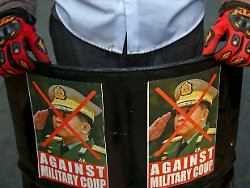Thursday March 11th 2021
More pressure on Myanmar's military
USA sanction children of junta chief
The US is tightening its sanctions over the coup in Myanmar. The US Treasury Department has now blacklisted two children of junta leader Min Aung Hlaing. They are said to have benefited from their father's behavior.
The US government is imposing sanctions on two adult children of the leader of the Myanmar military junta, Min Aung Hlaing, and six companies they control. Aung Pyae Sone and Khin Thiri Thet have used the relationship with their father, the chief of the armed forces, "for a long time to enrich themselves," said US Secretary of State Antony Blinken.
"The leaders of the coup and their adult relatives should not be able to benefit from the regime while it is using violence and tightening its stranglehold on democracy," said Blinken. The military must immediately reinstate the democratically elected government, stop the violence against demonstrators and release everyone who has been wrongly arrested, said Blinken. So far, more than 60 people have been killed in the peaceful protests.
After the US move, Great Britain is also examining additional measures against Myanmar, said Foreign Minister Dominic Raab. "We are aware that the regime must not be allowed to benefit from abuse of power and human rights violations," said Raab on Twitter.
US property is frozen
Since the coup on the night of February 1, the United States had already imposed strict export restrictions on the Southeast Asian country and imposed sanctions on around a dozen members of the new leadership apparatus, in particular on junta leader Hlaing. The commander-in-chief led the coup on February 1 and put himself at the head of the ruling state administration council. His two children control a total of six companies in Myanmar.
Due to the new sanctions, all property belonging to the affected individuals and companies in the USA will be frozen. US companies and individuals are also prohibited from doing business with them. If the sanctioned persons do not have any property in the USA, international business becomes more difficult for them anyway, also because many banks are now likely to shy away from doing business.
The human rights organization Human Rights Watch welcomed the move by the US Treasury Department, as it was aimed directly at Hlaing's income, but called for stronger sanctions. "These are not the kind of punitive measures that we believe will result in behavior change. We recommend that they focus on the ongoing streams of income, which are far larger and, if cut off, far more painful for the military as an institution, "said John Sifton, Asia director for Human Rights Watch.
.
